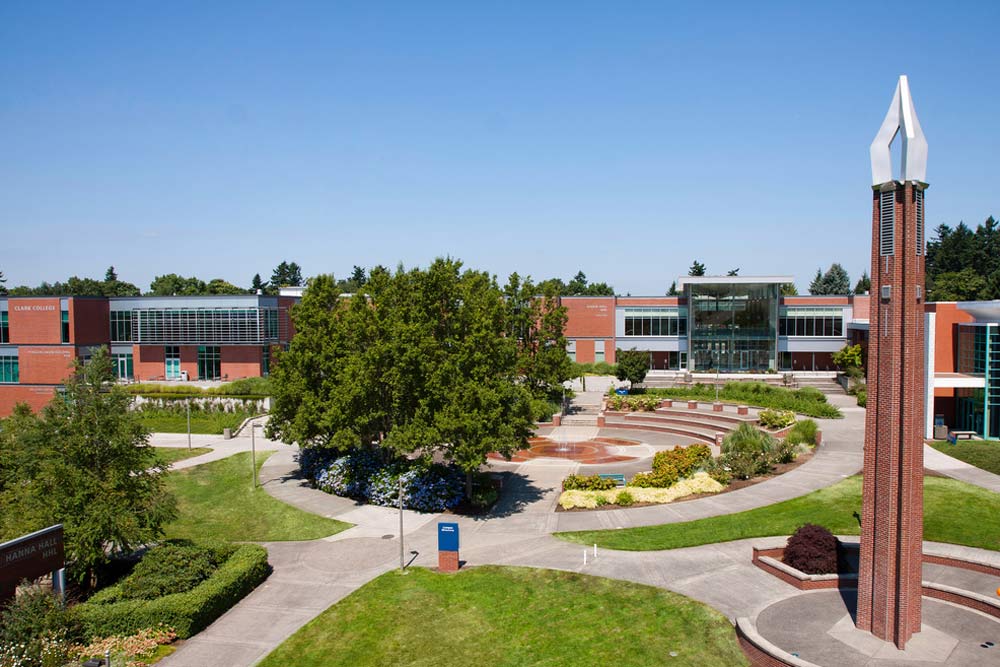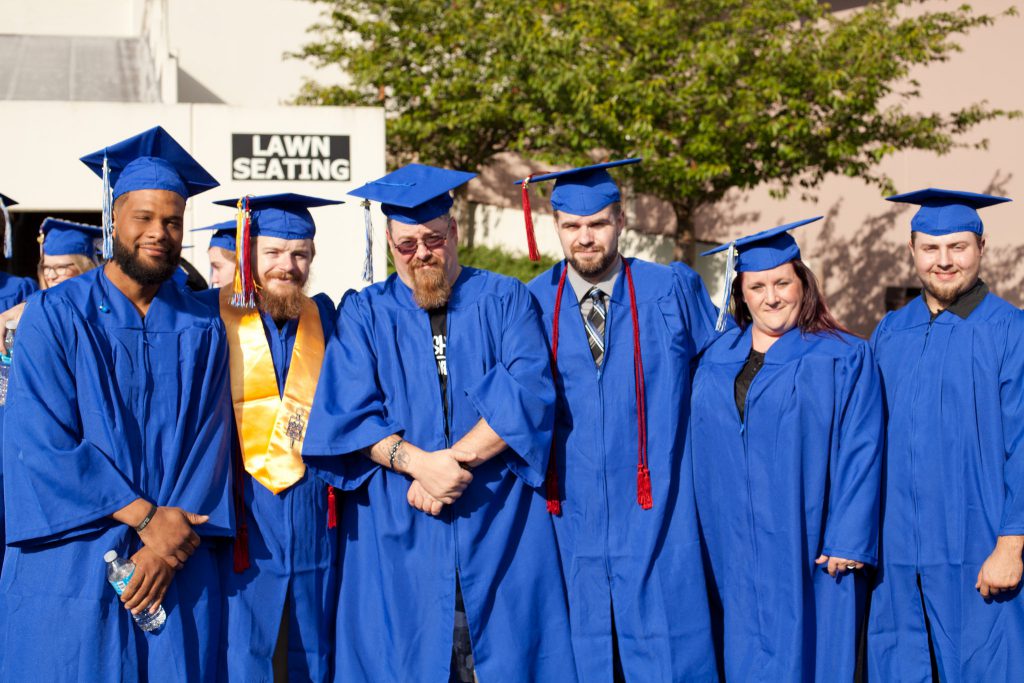
Graduates from Clark College’s welding program wait to enter the Sunlight Supply Amphitheater before the college’s 2016 commencement ceremony.
“Mommy did it!” read the message on Ashley Ellis’s mortarboard cap, the glittery writing sparkling in the sun as she waited outside the Sunlight Supply Amphitheater before Clark College’s 80th Commencement ceremony on June 16.
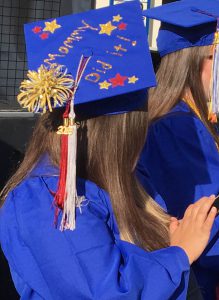
Ashley Ellis
Ellis wrote the message for her 2-year-old son, Paul, who would be in the stands watching his mother receive her Associate in Applied Technology degree in pharmacy technician—making her the first generation of her family to earn a college degree.
“I just wanted to show my family that I could do more,” Ellis explained. “I dropped out of high school at 16, and now here I am graduating with honors.”
As was the case for many of the approximately 720 Clark graduates waiting to process, Ellis’s achievement did not come without sacrifice. “I didn’t sleep a lot,” she said with a laugh. “I got up at 3:30 a.m. to study sometimes.”
While many graduates, like Ellis, came to Clark after time away from school, others had attended Clark before they’d even graduated from high school. This year’s graduating class included 346 members of Running Start, the Washington State program that allows high school students to attend college tuition-free. This was a record number of Running Start graduates for the college; 170 of them graduated with honors.
“I really felt like the experience I had at Clark prepared me so much—not just for college, but for life,” said Running Start graduate Anita Bejan; the three fellow Running Start graduates standing with her nodded in agreement.
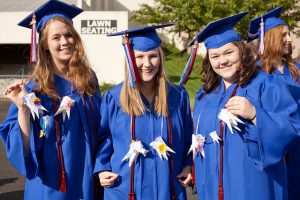
Bachelor of Applied Science in Dental Hygiene graduates
Another large group of graduates stood together, chatting and playing with the oversized paper teeth necklaces hung around their necks. These women were some of the 23 graduates from the college’s new Bachelor of Applied Science in Dental Hygiene program. This is the first cohort of students to earn their BAS since the program launched in fall 2014, making it the college’s first baccalaureate degree. The college is in the process of getting a second BAS program, in Applied Management, accredited and able to enroll students in the 2017 winter quarter.
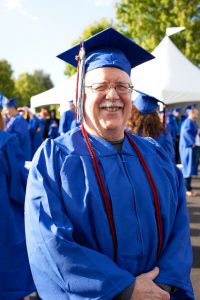
Bruce Becker
Graduate Bruce Becker, who was waiting to receive his Associate of Arts in Business Administration, said he hoped to enroll in the new BAS. Becker came to Clark after a traffic accident left him unable to do his old job. “It had been 47 years for me since I’d last been in school, so it was a little challenging at first,” Becker said. “But it’s been really fun. I’ve had a blast.”
Jessica Sanchez was also ready for more school. Sanchez was one of about 20 Transitional Studies graduates waiting to receive their High School Diploma or GED recognition. This is the second year that Transitional Studies graduates have been recognized at Commencement.
For Sanchez, this moment had been four years in the making—two spent learning English through Clark’s English as a Second Language program, followed by two of basic education. “I already had a high school diploma,” said the 26-year-old native of Mexico, who plans to continue in Clark’s for-credit classes. “And then I had to do it all over again, but in another language. I really liked doing it at Clark College, because you can get one-on-one tutoring and there’s great support.”
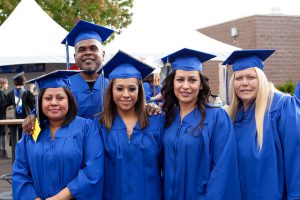
Jessica Sanchez, third from left, stands with some of her fellow 2016 Transitional Studies graduates.
Another high school diploma recipient, Esmeralda “Vita” Blanco, addressed the audience inside the amphitheater as one of two student speakers included in the ceremony. Blanco, a single mother of two who dropped out of high school after becoming pregnant, spoke movingly about the ways pursuing her education has changed her and her family’s life. “I strongly believe I’m taking away more than a diploma,” she said. “What I’m really getting is a world of new opportunities, one I can share with the two most important people in my life: my daughters.”
Associate of Arts degree recipient Megan Cook, who attended Clark through Running Start, spoke about the wide range of students she’s encountered at the college. “There are graduates here who are the first in their family to go to college, and those who are learning right alongside their parents,” she said. “I’ve met people of all ethnicities, ages, and genders, and that isn’t necessarily something you find at every college or university.”
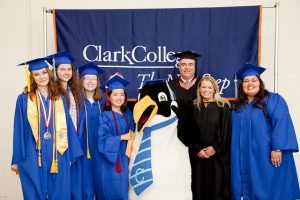
Left to right: Washington All-Academic Team member Tammy Senior, ASCC president Sarah Swift, student speaker Megan Cook, Washington All-Academic Team member Qi Wu, Clark College President Bob Knight, keynote speaker Jessica Lynch, and student speaker Vita Blanco smile with Oswald before going onstage for the 2016 Commencement ceremony.
This year’s keynote speaker was former prisoner of war Jessica Lynch. “Each one of us has some type of obstacle, some type of struggle that wants to hold us down,” she said. “Do not let it.”
The ceremony was occasion for Clark College President Robert K. Knight to announce the names of the recipients of the 2016 Exceptional Faculty Awards. The 2016 awardees are history instructor Joseph Cavalli; business technology instructor Dr. Kathleen Chatfield; geography professor Heather McAfee; and French professor Doug Mrazek, who is retiring after 38 years at the college.
President Knight also announced the recipient of the 2016-2017 Community College Presidents’ Scholarship in Honor of Val Ogden, which is given to a Clark College graduate who demonstrates leadership potential, a commitment to community service, and academic achievement. The scholarship award provides full-time tuition at Washington State University Vancouver (WSUV) and is renewable for one additional year, essentially providing full tuition to complete a bachelor’s degree. This year’s recipient was Holly Varner. Two other nominees, Abigail Bambilla and Adeena Rose Wade, received $1,000 each.
President Knight concluded the evening by saying, “We are excited to think of the ways in which you will change the world. And we are glad to know that Clark College will always hold a special place in your hearts. Remember: Once a member of the Penguin Nation, always a member of the Penguin Nation!”
Approximately 2,000 degrees and certificates were conferred in total on the Class of 2016.
Photos: Clark College/Jenny Shadley
See more photos from Commencement in our Flickr album.
See full video coverage of the ceremony online from CVTV.
